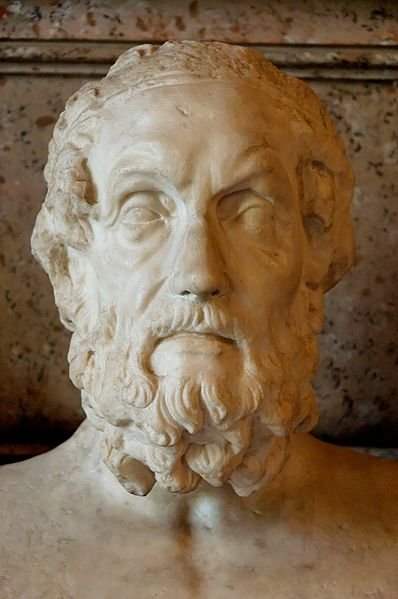The universe of Homero // Analysis

Homero, source of image of mastery of wikimedia commons
Homero describes in many metaphor the natural phenomena, speaks about the change of the stations, about the fog, winter cold, describes the streams that in autumn cover the fields of the men with mud and pebbles, continues to the cranes in his autumnal trip towards the south, narrates as in spring swarm of fly they flutter on the buckets brimming with frothy milk and as once enormous flocks of aquatic birds they invaded the bank of the river Caistro. The description of the interior world of the men of this epoch is very detailed, Homero makes to reflect on his personages on his perceptions and feelings, makes him tell the motives of his acts and when they are not they same who take the words, the narrator deals with explaining them, it is that's why like the imagination us colorea a dynamic world of the aristocrats of the VIIIth century a.c; in the Odyssey, where he speaks to us about the simple people, that we discover, that are persons as us, who have feelings of friendship, hate, love, fear happiness, pain of anger.
The almost endless enumeration of whom murdered and of what way, which is do we find it in the Ilíada, is the part of the work of Homero, which today in our time still supports it, the fascinating thing of following this history in which all this multitude of beginning of killing and of dying, they discover in him a sociology of nobility of his time, since he finds beginning of the social organization and distinguishes the values and the compression of yes same, inside the world of Homero.
In the Homeric description of perception it is discovered persons, who reflect, which happens in the nature and inside the persons an event does not take place and in the restored ones there is recognized the vision of the world of the public aristocrat.
Although there are different the lives of Homero that have come up to us, his content, included the famous blindness of the poet, it is legendary and fictional. The most ancient attributed without foundation to Herodoto, byline of the Vth century B.C. In her, Homero is presented as the son of a seduced orphan, of name Creteidas, who gave birth in Esmirna. Acquaintance as Melesígenes, soon stood out for his artistic qualities, initiating a Bohemian life. An illness made it blind, and since then it happened to be called Homero. The death, according to the seudo Herodoto, always surprised Homero in Íos, in course of a trip to Athens. 